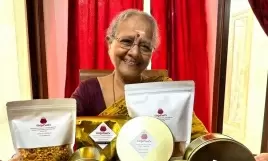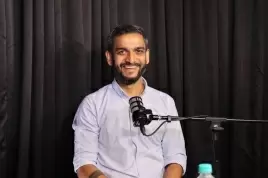From Chalkboards to Life Lessons, One Teacher’s Vision is Shaping the Future of Tribal Students in Odisha
Niroj Ranjan Misra
|
04-October-2024
Vol 15 | Issue 40
Ramababu Miniaka, a young Kondh tribal from Odisha’s Rayagada district, is grateful to his teacher, Dr. Dwiti Chandra Sahu, who taught him and his friends at the residential Ashram School in Bakurguda.
This government-run school caters to children from scheduled caste and scheduled tribe communities.
When Ramababu was in school until 2018, his parents would visit him weekly and give him some pocket money. Dr. Dwiti stepped in and taught him the value of saving through Ama Bank, one of Dr. Dwiti’s initiatives in the school.
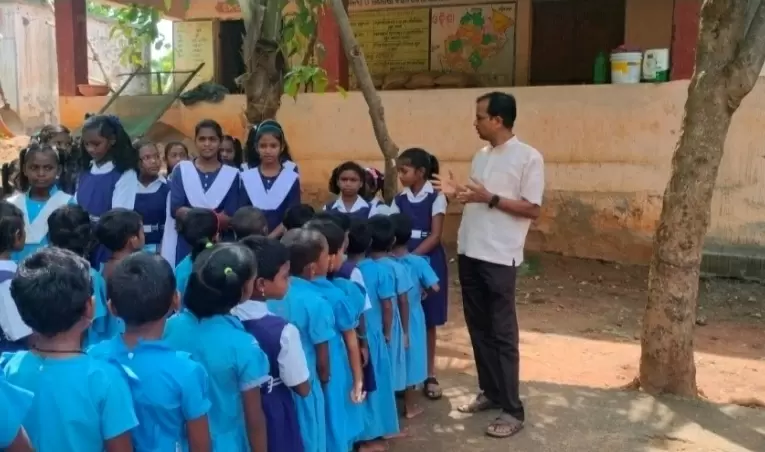
| Dr. Dwiti Chandra Sahu introduced several innovative programmes in the schools he has served (Photos: Special Arrangement) |
“My hostel mates and I could only withdraw our saved money on Saturdays and Sundays to buy books, notebooks, and writing materials. However, the bank didn’t offer any interest on our savings,” shares Ramababu, who now studies at BJB (Buxi Jagabandhu Bidyadhar) Autonomous College in Bhubaneswar.
He hails from Kotapeta village, located about five kilometres from Rayagada’s district headquarters.
Dr. Dwiti’s Ama Bank, run and managed by his students, is just one of his many innovative ideas. Other initiatives, like Ama Cooperative Store (Our Cooperative Store), Bal Adalat (Children’s Court), Child Reporters’ Club, and Mock Parliament, not only entertain but also educate his students about society, culture, and democracy.
For Dr. Dwiti believes that while books and notebooks may be imperative for the children’s education, extra-curricular activities such as sports, art and craft are equally important for the proper development of their personality.
He procured books, notebooks and other study materials at wholesale price and sold them to students at the same price through ‘Ama Cooperative Society’ that he set up at the school.
His Bal Adalat resolves disputes among students in the Ashram Schools, where one student plays the role of a judge, and others act as public prosecutors and defence lawyers under his supervision. If the accused is found guilty, they are asked to apologise publicly and promise not to repeat their mistake.
“Dwiti Sir also encouraged us to hold Mock Parliament sessions where we discussed ways to improve our school. We even had a budget session to plan how to spend government funds wisely,” says Jyoti Himirika, a Kondh tribal girl who studied at the Ashram School in Bakurguda from Class 1 to Class 7.
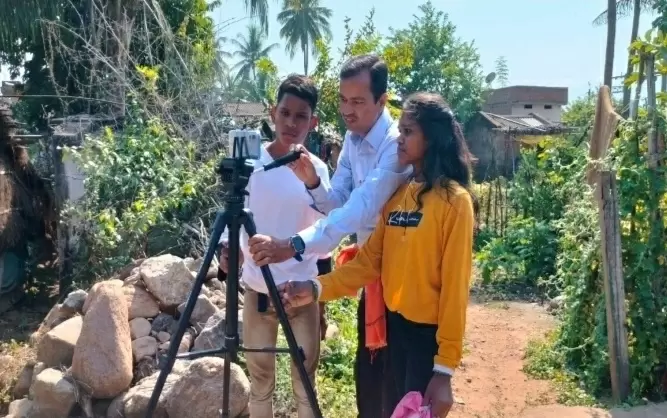
| Dr. Dwiti shooting for his documentary with his two of his students |
Elections for the school cabinet are held every July, and different ministries, such as Environment, Education, and Food, are assigned to the elected students.
The Cabinet, Mock Parliament, and Budget Session gave students a practical understanding of how a democratic system works, according to Jyoti, who once served as the 'chief minister' of her school's cabinet. She comes from Kuijingi village, located about nine kilometres from Rayagada district headquarters.
“I used to skip classes and wander around in my village, Biranarayanpur, which is about six kilometres from Rayagada headquarters. I continued this behaviour from Class 1 to Class 4. But after Dwiti Sir joined our Ashram School in Bakurguda during my time in Class 5, I not only became serious about my studies but also actively participated in extracurricular activities,” says Gulsan Kandagari, a young Kondh tribal who is now pursuing graduation at Rayagada Autonomous College.
For his outstanding contributions to his students’ holistic development, Dr. Dwiti has received several accolades, including the State Teacher Award in 2016 and the Sarvapalli Guru Samman in 2014. Recently, on September 5, he was one of 50 distinguished teachers nationwide to receive the National Teachers’ Award, 2024, from President Droupadi Murmu.
Dr. Dwiti has always encouraged his students to connect with the local community and address their issues. He formed Child Reporters' Clubs in each of the six Ashram Schools in Rayagada district, where he has worked.
Students in these clubs report local problems in the school’s wall magazine, another of Dr. Dwiti’s initiatives. “When officials from Rayagada block administration visit our schools, they often read our reports. Once, we highlighted a water-logging issue in Bakurguda, and the officials took immediate steps to fix it,” says Rambabu.
Education remains Dr. Dwiti’s primary focus, as he himself faced hardships in continuing his studies due to financial constraints. He completed his intermediate (science) at Gunpur College in Rayagada in 1993 and later finished a CT (Certificate in Teaching) Course in 1995.
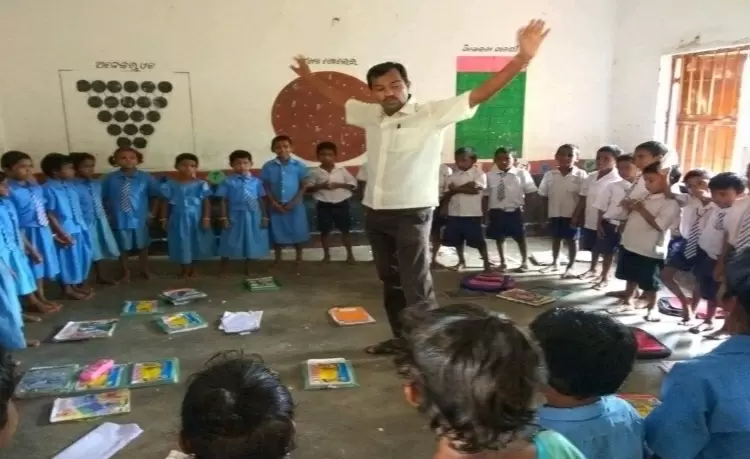
| Dr. Dwiti interacting with his students at a creative session |
Though he wanted to pursue higher education, his father, Udhav Sahu, who rented land to farm, couldn’t afford it. This motivated Dr. Dwiti to emphasise the importance of education for his students. He introduced innovative methods like Speaking Wall and Pitaarra to make subjects like mathematics and geography more accessible.
The Speaking Wall, first introduced in Ashram School, Pitamal, in 2022, combines Saura tribe’s wall murals and Dongria Kondh tribe’s embroidery art. Students use these tribal arts to do mathematical sums on the classroom walls, which helps even those initially scared of mathematics. Pitaarra encourages students to cut, shape, and create maps of different states and countries.
Dr. Dwiti himself had a stint as a reporter for two Odia dailies, Samaj and Anupam Bharat, until 2001, when he secured a position as a Matric CT teacher at the Ashram School in the village of Kumbhikata, Rayagada district.
He completed his graduation in education and pursued post-graduation in Odia and journalism through distance education. Over the course of his 23-year teaching career, he also earned a PhD in tribal studies in phases.
Currently, Dr. Dwiti is a trained graduate teacher at the Government High School in Billesu, Rayagada, a predominantly tribal district. He has used Information and Communication Technology (ICT) creatively to help his students, despite frequent power outages and unreliable Internet connectivity in the area.
“He downloads study materials using his mobile phone in areas where power and Internet are available, and then integrates them into his tablet and phone. This way, his students can access the materials even when there’s no power or Internet connectivity,” says Basant Nayak, the district education officer of Rayagada.
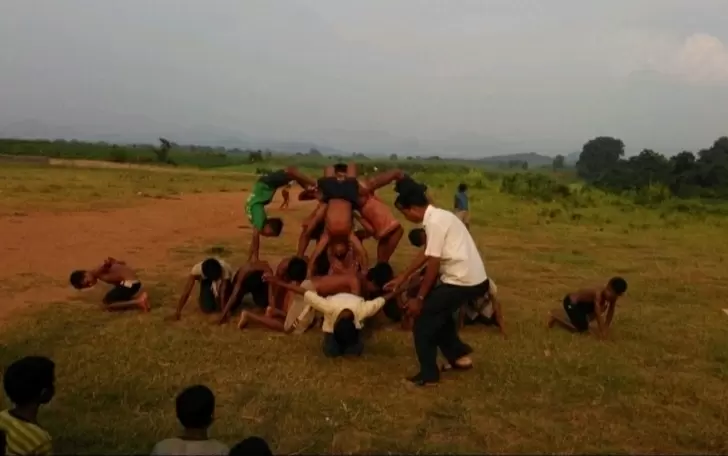
| Students shaping up into a pyramid under the supervision of Dr. Dwiti |
His commitment to environmental conservation has also been recognised. Under his guidance, students plant trees and participate in cleanliness campaigns both in and around the school, leading to the state’s Forest and Environment Department conferring the Prakriti Bandhu Award on him in 2017.
Dr. Dwiti also nurtures the creativity of his students, encouraging them to write in both Odia and Kui (the language of the Kondh tribe). “During my time at Ashram School, Bakurguda (2015-2019), we formed a team of eight students who loved to write. Together, we wrote 26 bilingual books, three of which were published by Sikshasandhan, a Bhubaneswar-based NGO,” says Dr. Dwiti.
In addition, Dr. Dwiti played a key role in establishing a tribal museum at Government High School, Billesu, where traditional tribal attire, musical instruments, hunting tools, and other cultural artefacts are displayed. He has also produced and directed nearly 12 documentary and feature films, with some scripts written by his students.
Three of his films, Nagabali Ra Dukha (Tragedy of Nagabali), Majesh Ra Chithi (Letter of Majesh), and Paribartan Ra Asha (Hope of Change), were screened at the Kollola Children’s Festival in Bhubaneswar in 2023. The films address issues like water pollution, climate change, labour migration, and the evolving social landscape.
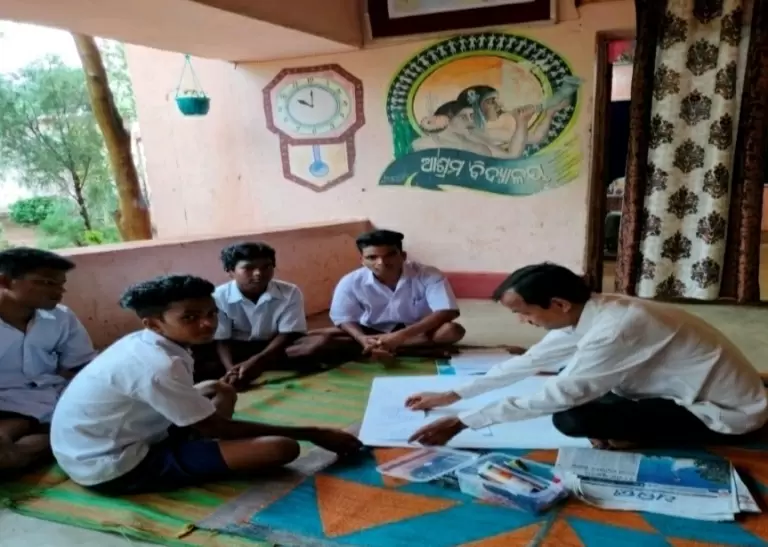
| Dr. Dwiti uses innovative methods to teach various subjects to his students |
“During my time at Ashram School in Bakurguda, a group of tribal students under Dr. Dwiti’s leadership performed traditional dances at the National Tribal Carnival in Delhi in 2016,” says Srinivas Rao Ladi, the headmaster of Government High School, Billesu.
“Dr. Dwiti has a talent for identifying students who have drawing abilities. He provides them with drawing sheets and encourages them to express their creativity through art. Similarly, students who show skill in craftsmanship are motivated to create toys, pen stands, and other decorative and functional items using cardboard.” - ©TWL








